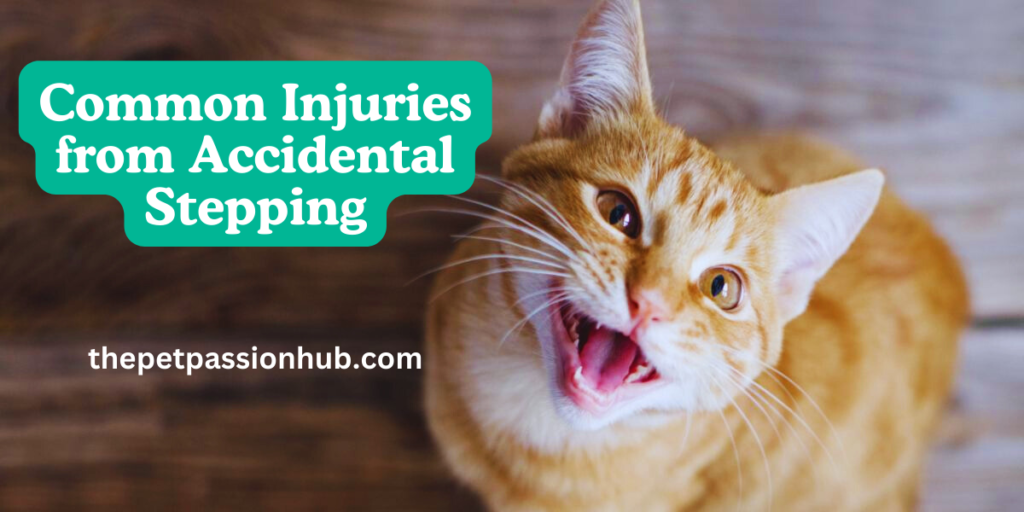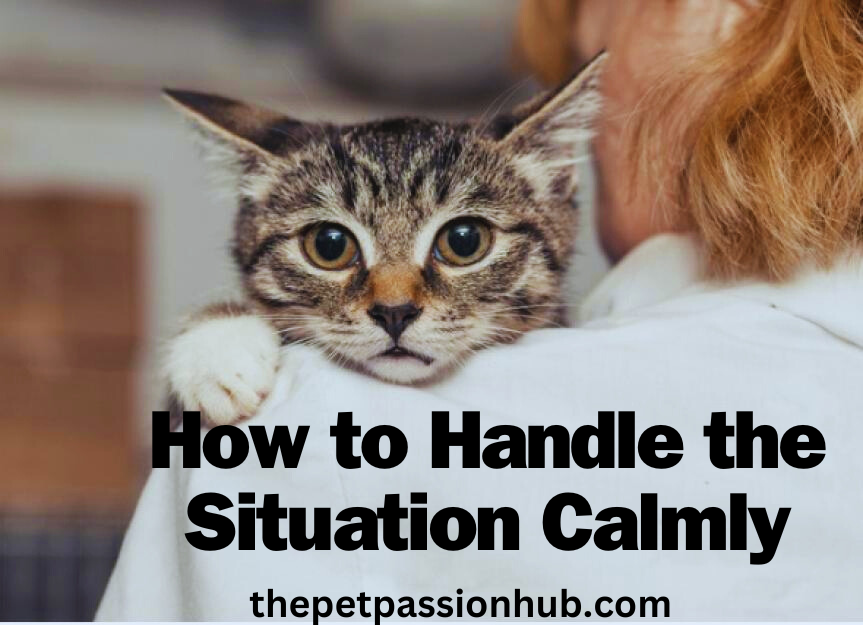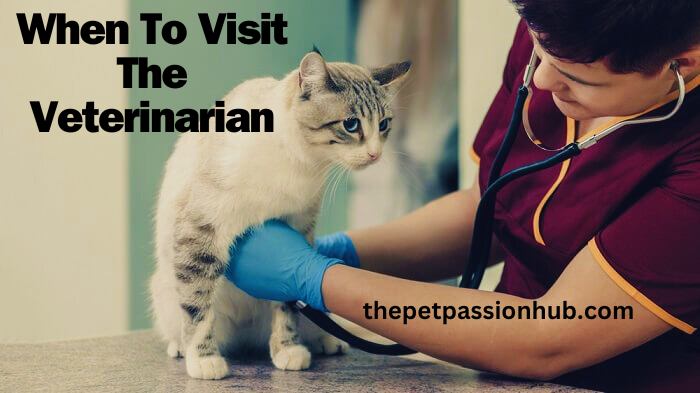Introduction
Have you ever felt that sinking feeling in your stomach when you accidentally step on your pet’s tail or paw? The instant mix of surprise, guilt, and concern can be overwhelming.
As a pet owner, it’s a scenario we all dread and hope to avoid at all costs. But what happens when this accidental mishap occurs?
Do our furry friends understand it was an accident, or do they hold a grudge?
In this article, we’ll explore the physical and emotional impact of unintentionally or Accidentally Step on a Furry Friend. As well as the best ways to handle the situation with care and understanding.
Understanding pets’ reactions to stepping on
When we accidentally step on our beloved furry friends, it’s important to understand their reactions to such incidents.
While some pets may yelp or whimper in pain, others might not show any immediate signs of distress.
It’s crucial to remember that animals have evolved to hide their pain in the wild as a survival mechanism. So even if your pet isn’t displaying obvious discomfort, it doesn’t mean they’re unaffected.
Additionally, individual animals may react differently based on their breed, age, and past experiences with physical trauma.
Understanding these nuances can help us better care for our pets and provide appropriate support when accidents occur.
Pets’ reactions to being stepped on are also influenced by their relationship with their owners. And the environment in which the incident occurs.
For instance, a pet who feels secure and bonded with its owner may be more resilient when facing accidental harm. While other animals may become fearful or anxious after such an experience.
The context of the situation—whether at home or in a new location—can also impact how a pet responds to being stepped on.
Ultimately, being attuned to our pets’ behavior and body language is key in recognizing any potential distress they might be experiencing after an accidental injury.
What Happens When You Accidentally Step on a Furry Friend?
The Science Behind Pain Sensitivity in Pets
Understanding the science behind pain sensitivity in pets is crucial for pet owners to grasp the extent of their furry friends’ experiences.
Despite pets not being able to verbally communicate their pain, studies suggest that animals have similar neural pathways. And chemical processes as humans when it comes to experiencing pain.
Neuroscientists have discovered that both cats and dogs have complex nervous systems, allowing them to sense pain in a way that closely resembles human perception.
Furthermore, research indicates that pets may exhibit behavioral changes when in discomfort, emphasizing the importance of recognizing and addressing their signs of distress.
Apologizing to a pet after accidentally causing them pain goes beyond mere words; it acknowledges their ability to feel and empathize with their experience on a deeper level.
It’s about understanding that they undergo genuine physical sensations, rather than just fleeting reactions.
By comprehending the intricacies of pain sensitivity in pets from a scientific standpoint, we can cultivate a greater appreciation for their welfare and strive towards more mindful interactions with our beloved companions.
Common Injuries from Accidental Stepping
Accidentally step on a furry friend can lead to several common injuries, including bruising, lacerations, and broken bones.
Even though pets are often resilient and forgiving creatures, the impact of an accidental step can cause significant pain and distress.

Bruising is a frequent outcome, as the force of the step can damage soft tissue beneath the skin. In more serious cases, lacerations may occur if sharp objects or uneven surfaces are involved.
Furthermore, broken bones are a real possibility in these situations, especially if the pet is small or fragile.
The weight of a human foot on a delicate paw or limb can easily result in fractures that require immediate medical attention.
It’s important to remember that even minor accidents can have severe consequences for our furry companions, but being aware of potential injuries and seeking prompt veterinary care can make all the difference in their recovery process.
What happens if you accidentally step on a cat?
Recognizing Signs of Distress in Pets
Recognizing signs of distress in pets is crucial for maintaining their well-being and ensuring a harmonious relationship with them.
Often, pets communicate their discomfort through subtle cues that require astute observation.
For instance, a sudden change in behavior such as excessive hiding or agitation may indicate an underlying issue.
Additionally, paying attention to physical indicators like changes in appetite, grooming habits, and restless behavior can provide valuable insight into your pet’s emotional state.
Furthermore, being attuned to your pet’s body language can unveil a lot about their mental and physical condition.
Lethargy, excessive panting, and avoidance of usual activities could be signs of distress that need immediate attention.
As responsible pet owners, we must educate ourselves on these warning signals and respond appropriately to ensure the well-being of our furry companions.
How to Handle the Situation Calmly
In the event of accidentally stepping on a furry friend, it’s crucial to remain calm despite the distressing situation.
First and foremost, take a moment to assess the animal’s condition without panicking. Approach them gently, speaking in soothing tones to reassure them and prevent further agitation.

Keep in mind that animals can pick up on human emotions, so maintaining a composed demeanor is essential for their comfort.
Embracing mindfulness during this challenging scenario can also be beneficial. By focusing on your breath and staying present in the moment, you can better manage your emotions and respond thoughtfully to the situation at hand.
Remember that remaining tranquil not only benefits the furry friend but also enables you to make rational decisions regarding their well-being.
Ultimately, handling this upsetting circumstance calmly is imperative for both you and your pet’s overall safety and peace of mind.
Can Dogs Eat Corn? Benefits and Risks of This Popular Veggie for Your Pup
Preventing Accidents in the Future
Accidents can be devastating, especially when they involve our beloved pets. To prevent future tragedies, it’s crucial to take proactive measures.
One approach is to create designated pet-free zones within the home, reducing the likelihood of accidental mishaps.
Additionally, investing in proper training for both pets and their owners can significantly minimize potential hazards.
Moreover, regular maintenance of household items such as loose wires and slippery floor surfaces can help avert accidents before they occur.
Looking ahead, promoting awareness of pet safety and responsible ownership is essential for the well-being of our furry companions.
Encouraging open dialogue about pet accident prevention within communities can lead to increased awareness and ultimately reduce the frequency of heartbreaking incidents.
By fostering a culture of mindfulness and understanding around pet care and safety, we can work together towards preventing accidents in the future.
When To Visit The Veterinarian
If your cat is unresponsive, has pale gums, is in breathing distress, or cannot move, you should call your veterinarian immediately for an emergency appointment.
Similarly, if they have any other symptoms that could indicate an internal injury, such as vomiting or not passing urine, they need to see a vet.

If your cat cannot put any weight on one or more of their paws after 30 minutes, or if they cannot move their tail, you should also speak to your veterinarian urgently.
On the other hand, if your cat is breathing normally and moving normally but seems anxious and is hiding more, they may just need more time to get over the trauma.
If you’re unsure whether your furry friend needs a veterinarian, there’s no harm in calling one of the local veterinary offices for guidance.
No doubt your veterinary surgeon won’t mind the phone calls because they want to help to keep your pet safe.
Conclusion: The importance of empathy and caution
In conclusion, the incident when you accidentally step on a furry friend underlines the crucial importance of empathy and caution in our daily interactions with animals.
It serves as a powerful reminder that our actions can have unintended consequences, and it’s essential to approach every situation with sensitivity and awareness.
By cultivating empathy towards animals, we not only avoid causing harm but also foster a deeper connection with the world around us.
Furthermore, exercising caution is fundamental in preventing such incidents from occurring.
Whether it’s being mindful of our surroundings or taking extra care when moving around pets, practicing caution can go a long way in ensuring the safety and well-being of our furry companions.
The combination of empathy and caution forms the cornerstone of responsible pet ownership and animal stewardship, ultimately enriching our lives while creating a more compassionate and harmonious environment for all living beings.
FAQs
- What should I do if I accidentally step on my furry friend?
A: If this happens, immediately check your pet for any signs of injury and seek veterinary care if necessary. - Will my pet forgive me if I accidentally step on them?
A: Pets are forgiving, but it’s important to show them love and care after an accident like this. - How can I prevent stepping on my pet in the future?
A: Be mindful of your surroundings and try to keep your pet in sight when moving around the house. - What are the signs that my pet may be injured from being stepped on?
A: Limping, yelping, or favoring a limb are all potential signs of injury. - Should I give my pet treats after accidentally stepping on them?
A: Offering comforting words and gentle pets is more beneficial than treats in this situation. - Can accidental stepping cause long-term harm to my pet?
A: It depends on the severity of the incident; monitoring your pet’s behavior is important in the days following. - Will my pet avoid me after being stepped on by accident?
A: Initially, they might be cautious, but with time and affection, they will likely return to normal behavior. - Should I apologize to my pet for accidentally stepping on them?
A: Yes, offering sincere apologies and extra love can help rebuild trust with your furry friend.
